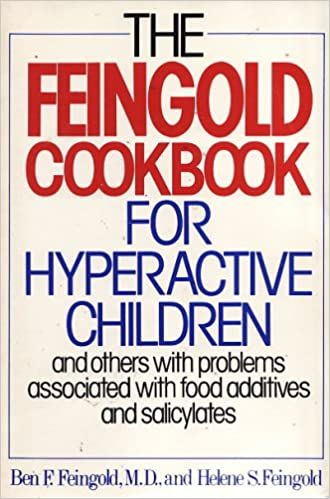
The Feingold Cookbook for Hyperactive Children
Dr. Ben Feingold, the pediatrician and allergist who wrote Why Your Child is Hyperactive, is a champion for dietary solutions to manage behavioral issues in children. In 1979, he published The Feingold Cookbook for Hyperactive Children. This book was developed on the basis that certain chemicals, such as artificial flavors, and artificial colors and preservatives that are in food can be detrimental to children, causing behavioral issues and interfering with learning ability. Feingold’s argument is that most neurotransmitters that affect mood and learning ability are developed in the gatrointestinal tract, from the foods we ingest. This book offers an alternative to pharmaceutical medication that has garnered successful results for many parents and children over the years, in achieving the goal of reduced hyperactivity in children, and improvements in the ability to focus.
The introduction of many of these “problem chemicals” in our foods began towards the end of Word War II, and Dr. Feingold was the first to notice how these chemicals triggered behavioral and learning issues due to their allergy-inducing properties. Some of the other symptoms Dr. Feingold observed at this time in patients of his were hives, asthma, headaches, stomach issues, urinary issues and nasal congestion.
The main food groups that the Feingold Diet eliminates are: 1) Synthetic (artificial) colors and flavors and preservatives BHT and BHA and 2) Fruits, vegetables and various other types of foods that contain natural salicylates. There are two stages for the diet. First, these two food groups are eliminated. Second, about 4 to 6 weeks later, if the child is responding with positive behavioral changes, food from the second group (salicylate fruits and vegetables) can be slowly re-introduced. But foods from the first group of synthetic flavors, colors and preservatives are not re-introduced at any point.
The Feingold Cookbook brings to light the scientific evidence that indicate diet can affect behavior and learning ability in children, and introduces a list of forbidden foods. And since it can be a challenge for many families to implement the dramatic changes the Feingold Diet requires, The Feingold Cookbook for Hyperactive Children offers helpful suggestions for recipes that have been used by families that follow this diet. Today, the Feingold Association has increased the Feingold food list to thousands of acceptable brand names of foods and non-food products.
About the Author
Dr. Ben Feingold is a pediatric allergist who taught pediatrics at Northwestern University Medical School in Chicago, and then moved to Los Angeles where he practiced pediatrics for 22 years. While in Los Angeles, Dr. Feingold served as chief of pediatrics at Cedars of Lebanon Hospital, was an associate in allergy at the Los Angeles Children’s Hospital, and an attending pediatrician at the Los Angeles County Hospital. His research has been a source of controversy and heavy discussion among certain bodies in government. But much of his research has been of much interest to the U.S. Senate and State of California. Dr. Feingold can be thanked for the removal of certain harmful substances from our food supply, as well as the increased safety in food production around the world.
Feingold’s research led to more research done by others, which suggested in 1980 that artificial food dyes might indeed adversely affect the behavior of children. In 1951, Dr. Feingold married his wife, Helene. Together, they wrote The Feingold Cookbook for Hyperactive Children, which was published in 1979, four years after Why Your Child is Hyperactive.
Dr. Feingold was born in Pittsburgh in 1900 and did his undergraduate and medical work at the University of Pittsburgh. He was an intern at Passavant Hospital in Pittsburgh, and then went on to serve as a fellow in pathology at the University of Gottingen in Germany in 1927, followed by a fellowship at the children’s clinic at the University of Vienna from 1928-1929.
Though Feingold is gone, the Feingold Foundation continues his valuable work and research, and you can find more information on their website.
Ablechild, ADHD, Children's Health, hyperactivity, Informed Consent, Mental Disorders In Children

